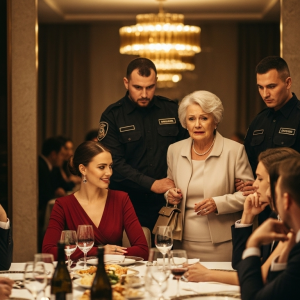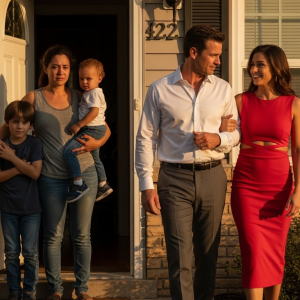The invitation arrived on a Tuesday, nestled between a utility bill and a stack of junk mail. The envelope was thick, expensive cream-colored cardstock. My sister Claire’s wedding. For seven years, there had been nothing. No calls, no texts, not even a cursory “Happy Birthday.” Seven years of a silence so profound I had come to believe it was permanent. And now this.
Tucked inside was a handwritten note in Claire’s unmistakable looping script. “I miss you. I want to fix things.” I stared at the words, a bitter laugh escaping my lips. Was this a prank? A twisted joke orchestrated by my stepmother, Denise? After everything they had done, after they had systematically cut me out of their lives, now they wanted me back in the fold?
To understand the audacity, you have to understand my family. Our mother passed away when I was fifteen and Claire was twelve. It shattered our world. But while I was drowning in grief, my father was already moving on. A year later, he married Denise, a woman who seemed to have a personal mission to erase every trace of my mother from our home. Within a month, the photos of my mother on the mantelpiece were replaced with glossy portraits of Dad and Denise. Her favorite armchair, the one with the worn floral pattern, disappeared, replaced by a cold, leather monstrosity she’d picked out. It wasn’t just redecorating; it was an erasure.
Claire, young and needing a maternal figure, clung to Denise like a lifeline. I couldn’t blame her then, but I couldn’t stand the woman who was methodically dismantling our past. As we grew older, the rift widened. When it was time for college, Dad refused to help me financially. “You need to man up and learn some responsibility,” he’d said. I was working two jobs to cover my rent, eating instant noodles four nights a week. A few weeks after my 21st birthday, I saw pictures of the new convertible he’d bought Claire for her 18th. The contrast wasn’t just stark; it was a declaration of my worthlessness to him.
While I was scraping by, building my event planning business from the ground up, Denise would dismiss it as me “playing around.” Claire, the golden child, was the family star, excelling in school and deserving of their endless support. Eventually, I had enough. I didn’t stage a dramatic confrontation; I just went silent. I stopped calling, stopped visiting, and poured every ounce of my energy into my life and my work. And I thrived. My business grew beyond my wildest dreams. I was finally in a place where I didn’t need them.
Which brought me back to the invitation. My first instinct was to burn it. But something—curiosity, a foolish flicker of hope sparked by Claire’s note—stopped me. I decided to go. I would walk into the lion’s den, see how things played out, and leave the moment it became unbearable. This was for Claire, I told myself. No one else.
Despite the years of bitterness, a part of me still wanted to do something for my sister. I called her and offered to plan the wedding, extending the full services of my company at a massive discount. She politely declined. “Thanks, Matt, but Denise has it all under control,” she’d said, her voice laced with an apology that felt rehearsed. The sting of the rejection was familiar, but I brushed it off. I had extended the olive branch. The rest was up to them.
The night before the wedding, sleep was a stranger. Memories flooded back in a relentless tide: holidays spent on the sidelines, conversations where Denise’s casual cruelty would slice me open while my father watched, the slow, painful realization that I was an outsider in my own home. I steeled myself. I was going for Claire. If things went south, I could leave. I had nothing to prove.
The next morning, I put on my best suit and drove to the venue. The place was breathtaking—a testament to a budget with no limits. As I walked through the doors, a wave of unease washed over me. This was it. The first time seeing them in seven years.
Claire, radiant in a flurry of white lace, greeted me with a warm hug. “I’m so glad you came,” she whispered. For a fleeting moment, I allowed myself to hope. Then I saw Denise, watching me from across the room like a predator sizing up its prey.
She glided over, her smile a perfect, polished lie. “Welcome, Matt,” she said, her voice dripping with fake sweetness. “Still running that little party business of yours? How quaint.”
I gritted my teeth. “It’s going well, thanks.”
She gave a dismissive smirk and turned away. Classic Denise. I found my seat for the ceremony, the initial hope already curdling in my stomach. The ceremony itself was beautiful. Claire seemed genuinely happy, and for a short while, I almost forgot the tension simmering beneath the surface. But this was my family. The peace was never meant to last.
At the reception, the knot in my stomach tightened. The hall was a fairytale of sparkling chandeliers and lush floral arrangements. But my dread wasn’t about the decor; it was about the inevitable confrontation. I found the seating chart, my eyes scanning for my name. Table 14. I didn’t need a map. In the unspoken hierarchy of weddings, Table 14 was in the “we-don’t-really-care-if-you’re-here” zone, somewhere near the kitchen doors and the distant cousins.
The insult was not subtle. My tablemates were a collection of forgotten relatives, including an aunt who constantly mispronounced my name and an uncle whose only topic of conversation was his coin collection. Meanwhile, Claire’s friends and Denise’s family were seated at the prime tables near the dance floor. It was so perfectly, predictably them. Seven years of silence, and they still found a way to label me an afterthought.
Fine. I didn’t come for the seating arrangement. I tried to play it cool, but the first landmine of the evening was already making a beeline for my table. My father. And he was drunk.
He slammed his hand on the table, making my aunt jump. “What the hell are you doing here, Matt?” he slurred, his voice loud enough to turn heads.
I was stunned. “I got an invitation, Dad,” I said, my voice dangerously calm. “Claire invited me.”
He snorted. “You should have stayed where you belong. Look at you, playing grown-up in your little suit. You don’t belong here. You’re a disgrace to this family, showing up with your glorified hobby.”
My face burned with a mix of fury and humiliation. Before I could respond, Denise appeared at his side, her timing impeccable. She gave me a smug little smirk. “Do you even make enough to buy that suit, Matt, or is it rented?”
That was it. The one-two punch of their contempt. I realized in that moment that you can’t reason with people who are drunk on booze and their own superiority. So I did the only thing I could. I stood up, smoothed my suit, and said, “Excuse me.” I walked away without another word, their laughter following me like a physical blow.
I didn’t head for the exit. I needed a moment. I stepped out onto the patio, the cool night air a welcome relief. The cheerful music from inside felt like a mockery. They couldn’t even let me exist for one night without trying to tear me down. I was about to leave for good, sticking to the edge of the room to avoid another scene, when I glanced at the event staff.
They moved with a seamless efficiency I knew all too well. Something about their professionalism, their discreet movements, felt familiar. And then it hit me like a physical shock. I knew these people. They weren’t just random caterers. They were my employees.
My mind raced. My company had recently acquired a smaller event planning business. This wedding was one of their contracts. No wonder the setup was so flawless. My team was running the show. Clare and Denise had hired my company—the “little party business”—without even realizing it. The power dynamics of the entire evening had just shifted seismically. And for the first time all night, I felt the unmistakable thrill of holding the upper hand.
I stepped into the shadows of the patio and pulled out my phone, my hands shaking not with fear, but with adrenaline. I dialed my operations manager, Kate.
“Hey, Kate,” I said, keeping my voice low. “Can you confirm the client’s contract for tonight’s wedding?”
“Sure, Matt,” she said, clearly puzzled. “Why?”
“I’ll explain later. Just tell me, does the contract include our standard termination clause?”
Kate didn’t have to look. “Yep. Hostile or discriminatory behavior toward staff or management gives us the right to terminate services immediately. Standard in all our agreements.”
Bingo.
“Perfect,” I said, a slow, cold smile spreading across my face. “We’re invoking it. Start packing up.”
There was a stunned silence on the other end. “Wait, what happened? Is everything okay?”
“Let’s just say the client has made it very clear they don’t want me—or by extension, my company—here,” I replied. “I’ll fill you in on the details later. Just trust me.”
Kate, ever the professional, didn’t hesitate. “Got it. I’ll handle it.”
I hung up, my heart pounding. This wasn’t just spite. This was a business decision. I would not allow my family to humiliate me and disrespect my life’s work while simultaneously benefiting from its quality. They had drawn a line in the sand. Now, I was drawing mine.
Back inside, the reception was in full swing, blissfully unaware of the impending chaos. My team, however, moved with quiet, deliberate purpose. It was like watching a magic trick in reverse. Floral arrangements began to disappear from tables. Uplighting rigs were discreetly dismantled. Table linens were rolled up. Guests, initially oblivious, started to notice, pointing and whispering.
Denise, too busy holding court at her table, was the last to realize what was happening. Finally, a server approached her, and her face went from smug satisfaction to pure fury in an instant. She shot up from her chair, her heels clicking like gunshots on the marble floor as she marched toward Kate.
“What is this? What the hell are you doing?” she shrieked.
Kate remained perfectly calm. “We’re following the terms of the contract, ma’am. Services are being terminated due to hostile behavior toward our management.”
Denise blinked. “What hostile behavior? Who even is your management?”
Kate simply gestured toward the patio where I stood watching. Denise turned, her eyes narrowing as she saw me. I gave her a small, polite wave.
She stormed outside, her face a mask of crimson rage. “You,” she hissed. “You can’t do this.”
“This is Claire’s wedding,” I replied calmly. “And this is my company. You made it clear you don’t respect me or what I do, so why would you want my services?”
Her jaw dropped. “You’re doing this to ruin Claire’s wedding out of spite!”
“No, Denise,” I said, my voice level. “This isn’t about spite. It’s about a clause in a contract you signed. You can’t humiliate the owner of a company and then expect his employees to continue serving you dinner. That’s not how business works.”
Before she could sputter another incoherent threat, Kate handed me a clipboard. “We’re ready to roll out, Matt. Everything’s packed.”
I nodded. “Thanks, Kate. Great work, as always.”
I turned back to the sputtering Denise, handed her my lawyer’s business card, and said, “If you have any further questions about the contract, feel free to reach out to our legal team. Have a wonderful evening.”
And with that, I walked away, leaving her standing speechless on the patio of a rapidly emptying reception hall.
The chaos that followed was immediate. My phone exploded with texts and voicemails. Denise led the charge with a volley of unhinged accusations. Dad left a drunken, rambling message threatening to sue my “ass.” But the message that stung, the one that gave me pause, was from Claire.
“Why would you do this to me? I thought you came to support me.”
It wasn’t venomous like Denise’s texts. It was genuine hurt, and for a moment, I felt a pang of guilt. But the guilt was quickly overshadowed by the absurdity of the situation. She was hurt that I had reacted to her family’s abuse.
The next day, Denise launched a smear campaign, leaving false, scathing reviews online and calling relatives to spin her version of the story. I was prepared. My lawyer sent a cease-and-desist letter for defamation, and the review vanished. The threatened lawsuit was even more laughable. Their lawyer—one of Dad’s poker buddies—sent a flimsy letter demanding a full refund and damages for “emotional distress.”
My lawyer was not amused. We had the signed contract, witness statements from my staff, and the pièce de résistance: security footage from the venue that captured Dad’s drunken tirade and Denise’s public insults. Faced with undeniable proof, their case crumbled. They dropped it within two weeks.
Amid the insanity, something unexpected happened. Business inquiries started rolling in from other wedding guests who had been impressed by my team’s professionalism, even in their quiet dismantling of the event. Denise’s attempt to humiliate me had backfired spectacularly, turning into the best free publicity I could have asked for.
A few weeks later, after the dust had settled, I got the text from Claire. “Hey, can we meet up? We need to talk.”
Against my better judgment, I agreed. We met at a small café. She apologized immediately, but it felt hollow.
“I’m really sorry about what happened,” she began. “But you have to understand, they were stressed. It wasn’t personal.”
I let out a bitter laugh. “Not personal? Claire, they called me a disgrace. They mocked my life’s work. How is that not personal?”
She shifted uncomfortably. “Look, I’m not saying they were right, but the way you handled it wasn’t fair. You turned my wedding into a spectacle, Matt. People are still talking about how you humiliated us.”
And there it was. The real reason for this meeting. Not my pain, but her social embarrassment.
“So this isn’t about how they treated me,” I said, my voice turning to ice. “It’s about how my reaction inconvenienced you.”
“That’s not what I’m saying!” she shot back, her voice rising. “I just think you could have thought about someone other than yourself for once! This was my wedding!”
The clarity of that moment was breathtaking. She wasn’t caught in the middle. She wasn’t a victim of Denise and Dad. She was one of them. Entitled, self-absorbed, and utterly incapable of seeing beyond her own narrative.
I stood up, tossing a few bills on the table. “You know what, Claire? I’m done. I have spent my entire life being the scapegoat for this family, and I am not doing it anymore. You don’t get to rewrite this story. I came to your wedding hoping things had changed, and I was met with the same calculated cruelty I’ve always known. And you’re blaming me for finally refusing to tolerate it.”
“Matt, wait—”
“No,” I said firmly. “I’m done. For good.”
I walked out of that café and never looked back. That was the last time I ever spoke to my sister. In the months that followed, my business thrived, my life found a new peace, and I finally understood what family meant. It isn’t about blood. It’s about respect. And they had never shown me any. I was finally free.




